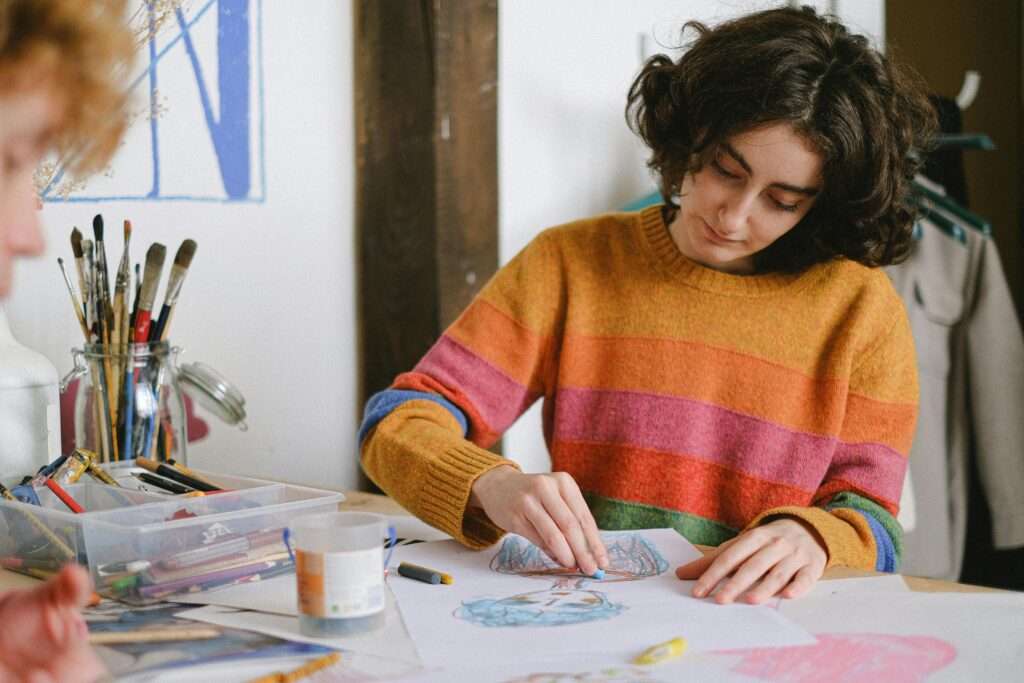Photo by Anna Shvets
Introduction
Embarking on the journey of higher education, especially pursuing a Bachelor of Fine Arts (BFA) degree, opens a realm of opportunities for you in the creative realm. This degree program delves into various facets of visual and performing arts, shaping your skills and knowledge in areas such as painting, sculpture, animation, and more.
As you near the completion of your BFA degree, it becomes crucial to explore the array of career options available, ranging from becoming a graphic designer, art director, or animator to venturing into roles such as art therapist, curator, or educator. Understanding the significance of exploring these career paths post-graduation aids in charting a fulfilling professional trajectory aligned with your passions and talents.
Overview
The Bachelor of Fine Arts (BFA) degree program typically spans over a duration of 3 to 4 years, providing comprehensive training in various artistic disciplines. Its primary objectives include honing your creative skills, fostering critical thinking, and nurturing artistic expression. Throughout the course, you’ll delve into areas such as painting, sculpture, graphic design, and multimedia programming, among others.
Upon completion, you’ll emerge equipped with a diverse skill set, paving the way for a myriad of career paths. Whether you aspire to become a painter, graphic designer, animator, or art therapist, the BFA degree opens doors to a wide range of opportunities in both private and public sectors.
Top 10 Career Options After Bachelor of Fine Arts (BFA) Degree
Here are the top 10 career options after earning a Bachelor of Fine Arts (BFA) degree:
1. Painter
2. Art Dealer
3. Exhibition Manager
4. Museum Curator
5. Art Historian
6. Artefact Restoration Artist
7. Art Therapist
8. Graphic Designer
9. Creative Director
10. Interior Designer
1. Painter
As a painter, your role extends beyond simply applying paint to a canvas. You delve into the depths of creativity, exploring various mediums like oils, watercolors, or acrylics to bring your visions to life.
Your creations serve as a medium of expression, conveying emotions, narratives, or concepts to your audience. Adeptness in color theory, composition, and technique is crucial for mastering this craft.
In the United States, painters earn an average annual salary of around $52,576, With a Bachelor of Fine Arts degree, you refine your artistic prowess, honing your skills to embark on a fulfilling journey as a painter.
2. Art Dealer
As an art dealer, you play a pivotal role in the art market, facilitating transactions between artists, collectors, and galleries. Beyond buying and selling artworks, your responsibilities may include curating exhibitions, managing inventory, and marketing artists.
Successful art dealers possess strong interpersonal skills, a keen eye for emerging trends, and an in-depth understanding of art history.
In the US, art dealers typically earn between $51,000 to $113,000 annually, Your Bachelor of Fine Arts degree not only hones your artistic talents but also provides a solid foundation in business and marketing, making you well-equipped for success in the art dealership industry.
3. Exhibition Manager
As an exhibition manager, your role goes beyond simply organizing art shows and exhibitions. You’re responsible for the entire process from conceptualization to execution.
This involves coordinating with artists, curators, and venue staff, managing budgets, marketing the event, and ensuring smooth operations during the exhibition. Your organizational, communication, and attention to detail skills are crucial for success in this role.
In the US, exhibition managers typically earn between $53,000 to $120,000 yearly, With your BFA degree, which provides you with artistic understanding and management abilities, you’re well-prepared to excel in this dynamic and rewarding career.
4. Museum Curator
As a museum curator, you’ll be responsible for preserving and showcasing cultural artifacts and artworks. Your tasks include acquiring new pieces, conducting research to authenticate and interpret items, designing exhibitions, and managing collections.
Essential skills for this role include a deep understanding of art history, strong organizational abilities, excellent communication skills, and attention to detail.
In the United States, museum curators typically earn between $35,000 to $72,000 annually. Your Bachelor of Fine Arts degree equips you with a comprehensive understanding of art, history, and curation methodologies, making you well-prepared for this career path.
5. Art Historian
As an art historian, your role delves into the depths of artistic evolution, examining the significance of various art forms, styles, and movements across different periods. You’re tasked with researching, analyzing, and interpreting artworks, deciphering their historical context and cultural relevance. Essential skills include critical thinking, research proficiency, and a profound understanding of art history.
In the US, art historians typically earn between $51,000 to $113,000 annually, With your Bachelor of Fine Arts degree, your acquired knowledge and analytical prowess align perfectly with the demands of this profession.
6. Artefact Restoration Artist
As an artifact restoration artist, you’ll engage in the meticulous process of preserving and restoring invaluable cultural artifacts. Your duties include thorough examination, cleaning, repairing, and conserving artworks and historical pieces.
This requires a deep understanding of art history, conservation techniques, and materials science. Skills such as patience, attention to detail, and manual dexterity are crucial.
In the US, artifact restoration artists typically earn $20,000 to $111,000 annually, Your Bachelor of Fine Arts degree provides a solid foundation for this specialized and rewarding career path.
7. Art Therapist
As an art therapist, you’ll facilitate healing through creative expression, guiding individuals in exploring their emotions, resolving conflicts, and enhancing self-awareness.
Your responsibilities include conducting assessments, designing personalized therapy sessions, and maintaining client progress records. Crucial skills for this role include empathy, active listening, and adaptability.
In the US, art therapists typically earn between $39,000 to $67,000 annually, Your BFA education provides a strong foundation in artistic techniques and psychological principles, preparing you to make a meaningful impact as an art therapist.
8. Graphic Designer
As a graphic designer, your role extends beyond just creating visuals; you’ll craft compelling narratives through imagery, typography, and layout. In today’s digital age, familiarity with AI-driven design tools like Adobe Sensei or Canva’s AI-powered features can enhance your workflow efficiency.
You’ll collaborate with clients to understand their brand identity and target audience, translating their vision into captivating designs. Proficiency in design software like Adobe Creative Suite and an eye for detail are crucial.
In the US, graphic designers earn $38,000 to $71,000 annually. Your BFA hones your creative instincts and design acumen, preparing you for diverse design challenges in this dynamic field.
9. Creative Director
As a creative director, you’ll spearhead the artistic direction of projects across various media platforms. Your role involves conceptualizing innovative ideas, providing guidance to design teams, and ensuring projects meet client objectives. Essential skills include creativity, leadership, and strategic thinking, along with a deep understanding of design principles.
In the US, creative directors can earn between $53,000 to $165,000 annually. With your BFA background, you’ll leverage your artistic expertise and management acumen to excel in this dynamic and influential position within the creative industry.
10. Interior Designer
As an interior designer, you’ll navigate the evolving landscape of design technology, including the integration of AI tools. These tools aid in space planning, material selection, and even predicting design trends.
Your role involves adapting to these advancements, leveraging AI to streamline workflows and enhance design precision. Alongside traditional design skills, familiarity with AI-driven software like AI SpaceFactory and Autodesk Generative Design is advantageous.
In the US, entry-level interior designers earn around $42,000 annually, while experienced professionals can make up to $79,000. Your BFA equips you with design sensibilities and spatial understanding vital for this profession.
Conclusion
In conclusion, the Bachelor of Fine Arts (BFA) degree opens doors to a diverse range of creative career paths. From traditional roles like painters and art historians to modern opportunities such as graphic designers and creative directors, the options are plentiful. Each career offers unique responsibilities, skills, and salary potential.
The skills cultivated during the BFA program align seamlessly with these professions, providing a strong foundation in artistic expression and critical thinking. By exploring these options thoroughly, graduates can embark on a fulfilling professional journey that combines their creative talents with lucrative opportunities for growth and advancement in the ever-evolving creative industry.
You May Like: Top 10 Career Options After Bachelor Of Science (BS) Degree In 2024 – BizMajesty
FAQs
Q. What can I do with a Bachelor of Fine Arts degree?
With a Bachelor of Fine Arts (BFA) degree, you have a multitude of career options in the creative realm. You can pursue roles such as a painter, graphic designer, art therapist, museum curator, or exhibition manager, among others. The degree equips you with artistic skills and critical thinking abilities, enabling you to express yourself creatively and pursue a fulfilling career aligned with your passions.
Q. What skills do I need for a career in the arts?
A career in the arts requires a combination of creative, technical, and interpersonal skills. These include creativity, artistic expression, proficiency in relevant artistic techniques or software tools, critical thinking, communication, and collaboration. Additionally, adaptability and a willingness to continue learning and evolving in your craft are essential for success in the dynamic creative industry.
Q. How long does it take to complete a Bachelor of Fine Arts degree?
Typically, a Bachelor of Fine Arts (BFA) degree program spans over a duration of 3 to 4 years, depending on the specific program and institution. During this time, students receive comprehensive training in various artistic disciplines and develop their skills through practical coursework, studio projects, and theoretical studies.
Q. What are the salary prospects for BFA graduates?
Salary prospects for Bachelor of Fine Arts (BFA) graduates vary depending on factors such as the chosen career path, location, level of experience, and industry demand. While entry-level salaries may start modestly, BFA graduates can expect competitive earnings as they gain experience and establish themselves in their chosen field. Salaries for BFA graduates range widely, with potential for growth over time and advancement into higher-paying positions.
Q. Can I combine my BFA degree with other disciplines or fields?
Yes, BFA graduates often have the flexibility to integrate their artistic skills and creative perspectives into interdisciplinary roles. This could involve combining art with technology, business, education, or therapy, among other fields. By leveraging their diverse skill set and interdisciplinary approach, BFA graduates can explore unique career opportunities and contribute to innovative projects that span multiple disciplines.













